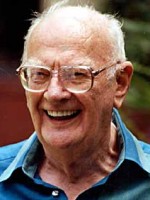 Birth : 16th December 1917 in Minhead, Somerset (U.K.)
Birth : 16th December 1917 in Minhead, Somerset (U.K.)
Death : 19th March 2008 in Colombo (Sri Lanka)
Sir Arthur Charles Clarke is a British science fiction author worldly known and a satellites pioneer.
The Clarke’s literary work is mostly characterised by his will to be as close as possible to the scientifical reality of the period when he write his stories. He is then a master of hard science.
But the epic dimension isn’t absent from his stories, far from it, and Clarke has always known how conceal poetical and technical aspects. Then, his work is recognizable, making us emotionally vibrate as the same time as anchoring us in the real world.
The war
His writing career begun during the second World War when he was R.A.F. officer, radar specialist, who collaborate to elaborate the detection system of British army. It was during this period that he was rewarded by a literary award organised by R.A.F. But it was in 1946 that he published his first professional short stories, Loophole, in the April issue of the Astounding Science Fiction magazine.
After the war
The war, apart from it allows him to make his debut in literature, interrupt the studies of a brilliant person. In this way, despite his intellect, it’s only just after the war he will obtain a firs–class degree in mathematics and physics to the London King’s College.
Astronautics pioneer, his major work in scientifical field is the concept of geostationary satellite, ideal relay for telecommunications, developed in the Extra-terrestrial Relays article in 1945, when the first satellite, Spoutnik, will be launched only twelve years later!
Writing career
From 1950, he devotes himself to literary with success, with notably the Rama series and, of course, the Odysseys which make him become a worldly known writer. His work is, by the way, overabundant and he excels in short stories (whose a lot of them will be rewrite by other authors, or adapted in novels).
In 1954, he met two loves: Elizabeth, who will become his wife, and Ceylan (Sri Lanka), an Indian Ocean’s island under British protectorate (at this time) where he will move in definitely in 1956.
He will carry out a double writer and lecturer career all over the world.
In 1973, he will formulate what we call the « Three Clarke’s Laws »:
- « When a distinguished but elderly scientist states that something is possible, he is almost certainly right. When he states that something is impossible, he is very probably wrong. »
- « The only way of discovering the limits of the possible is to venture a little way past them into the impossible. »
- « Any sufficiently advanced technology is indistinguishable from magic. »
Since 1989, epoch they diagnose a neurological illness (the post-polyo syndrome), he moved almost exclusively with a wheel chair.
He died the 19th March 2008.
People have a tendency to confuse us because we both write cerebral stories in which scientific ideas are more important than action.
Isaac Asimov, in “I, Asimov”
My opinion
Arthur C. Clarke is part of the writers dear to my heart, who I always read with pleasure, even if, at the end of his career, his productions were lower in quality and leave more place to collaborations with other authors (Paul Preuss, Gentry Lee, Stephen Baxter…)
But he gave us so many masterpieces (novels and also many short stories) that he remains one of my favourite authors.
Bibliography
The Space trilogy:
- Prelude to space, 1951
- The sands of Mars, 1951
- Islands in the sky, 1952
The Odysseys series:
- 2001 : a space odyssey, 1968
- 2010 : odyssey two, 1982
- 2061 : odyssey three, 1987
- 3001 : the final odyssey, 1997
The Rama series:
- Rendezvous with Rama, 1973
- Rama II, 1989, with Gentry Lee
- The garden of Rama, 1991, with Gentry Lee
- Rama revealed, 1993, with Gentry Lee
The Venus prime series (written by Paul Preuss after some Clarke’s short stories)
- Breaking strain, 1987
- Maelstrom, 1988
- Hide and seek, 1989
- The Medusa encounter, 1990
- The diamond moon, 1990
- The shining ones, 1991
The Time Odyssey series (with Stephen Baxter):
- Time’s eye, 2003
- Sunstorm, 2005
- Firstborn, 2007
Other novels (in chronological order):
- Childhood’s end, 1954
- Earthlight, 1955
- The deep range, 1957
- The city and the stars, 1960
- A fall of moondust, 1961
- Dolphin island, 1963
- Imperial Earth, 1975
- The fountains of paradise, 1979
- The song of distant earth, 1986
- Cradle, 1988, with Gentry Lee
- The ghost from the grant banks, 1990
- The hammer of God, 1993
- Richter 10, 1996
- The light of other days, 2000, with Stephen Baxter
Short stories collections (in chronological order):
- Reach for tomorrow, 1956
- The nine billion names of God, 1974

